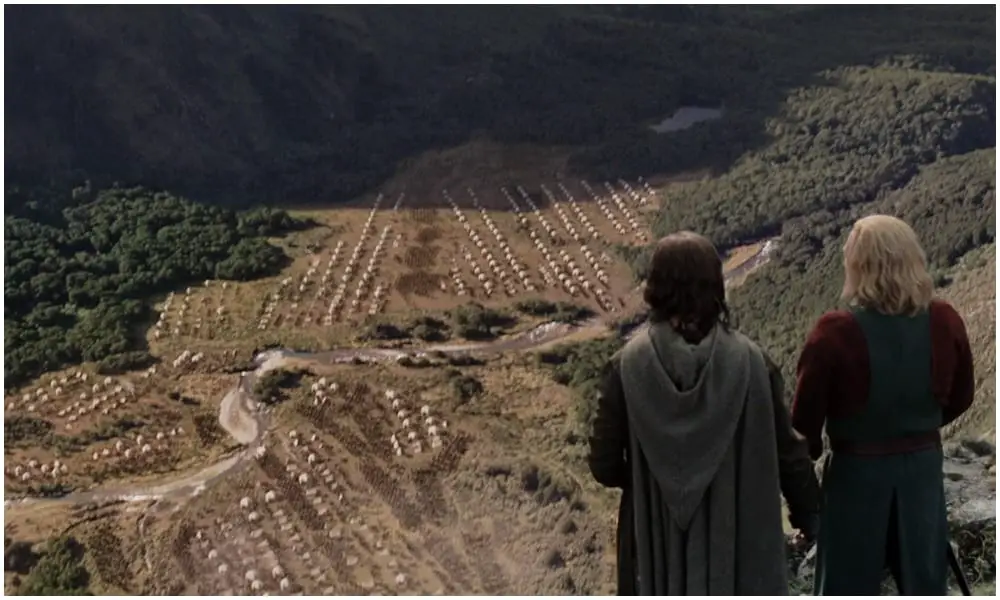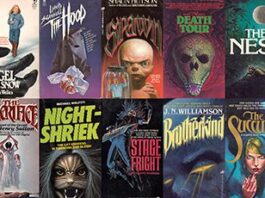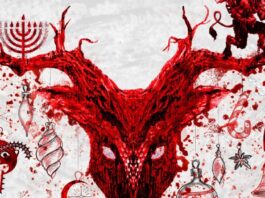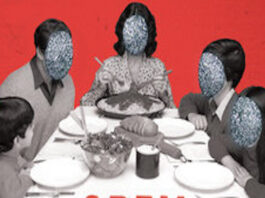It’s been too long! Finally, after a few chapters of non-stop action (you know, in relative terms) “The Muster of Rohan” brings us back to the nice, familiar ground of landscape descriptions. I’ve missed it. You must have noticed: last essay I had to pick a prose champion that didn’t mention trees or stars. In any case, “The Muster of Rohan” is an effective calm-before-the-storm moment, so long you are willing to include churning, gathering gloom under the umbrella of calm. It’s a quiet chapter, and there isn’t necessarily a lot that happens. But I like it despite and because of that. It’s a good companion to “The Passing of the Grey Company” and features small, potent character moments that tie together past and present.
The Insupportable Weight of Middle-earth
“The Passing of the Grey Company” leverages the past as an asset to the heroes of The Lord of the Rings. Aragorn is given direction and armed support by the Dúnedain, figures of his own past. He travels under the Dwimorberg to collect an army of long-dead ghosts who are atoning for past sins. And he is able to do that because of his own past, his heritage stretching back through the heirs of Gondor to Isildur himself. This all works to cultivate a sense that the world is on our heroes’ side—that history is unspooling in their favor, and all Sauron’s efforts are simply failed attempts to veer things off course.
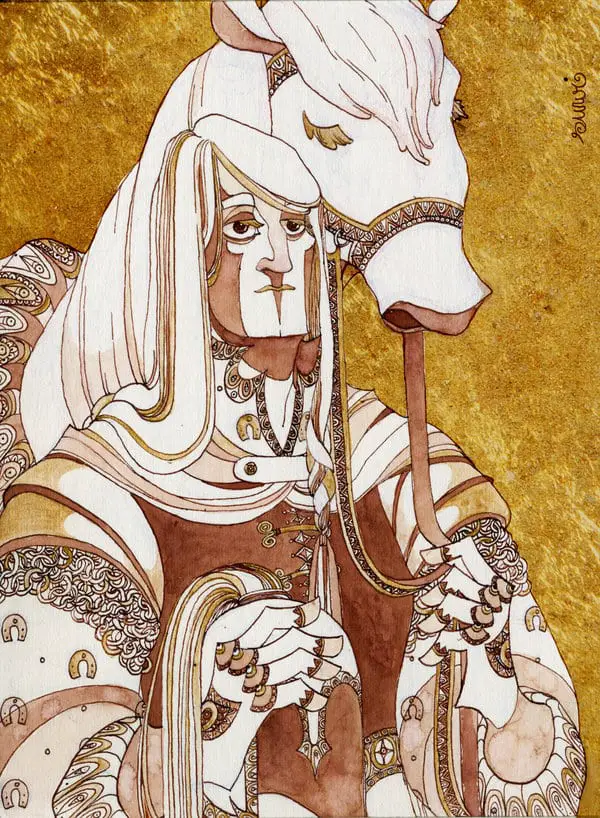
This sense is quickly set on its head in “The Muster of Rohan.” The universe and the physical world suddenly seem to become much more ominous. This is done through all the misty landscapes and looming mountains, of course. It’s made more manifestly obvious by the darkness that the Gondorian scout Hirgon saw “rise and creep across the sky” as he rode to Dunharrow, “eating up the stars.”
Merry relates a similar sort of feeling. After years of loving distant mountains through the windowpanes of stories, their actual presence leaves him unsettled. “He loved mountains, or had loved the thought of them marching on the edge of stories brought from far away; but now he was borne down by the insupportable weight of Middle-earth.” The world possess a menacing, ominous weight.
Past and Present
But it’s more than that. Tolkien has always edged his landscapes with danger, a sense that they exist and operate independently of those walking through them.
In “The Muster of Rohan” there is also a mounting sense of the indifference of history. When Tolkien has brought up the ruins of civilizations in the past, there is an imminence to them. Their greatness is a judgment on the lesser times that followed, or an inspiration to those in the present. In any case, they are remembered. Those who are forgotten are those who strayed into evil, into moral darkness and historical. And even some of those are remembered—there is, after all, the big ghost mountain from a few pages back.
There is less assurance of this in “The Muster of Rohan.” Théoden’s arrival at Dunharrow features reference to a people who have been forgotten:
“Great standing-stones that had been carved in the likeness of men, huge and clumsy-limbed, squatting cross-legged with their stumpy arms folded on fat bellies. Some in the wearing of the years had lost all features save the dark holes of their eyes that still stared sadly at the passers-by. The Riders hardly glanced at them. The Púkel-men they called them, and heeded them little: no power or terror was left in them… Such was the dark Dunharrow, the work of long-forgotten men. Their name was lost and no song or legend remembered it.”
The Púkel-men are an unknown entity, forgotten to the point that no one bothers to look at their remnants. This indifference of the past is particularly interesting considering that the book’s first two chapters deal with Gondor, a place defined by its memory and remembered past.
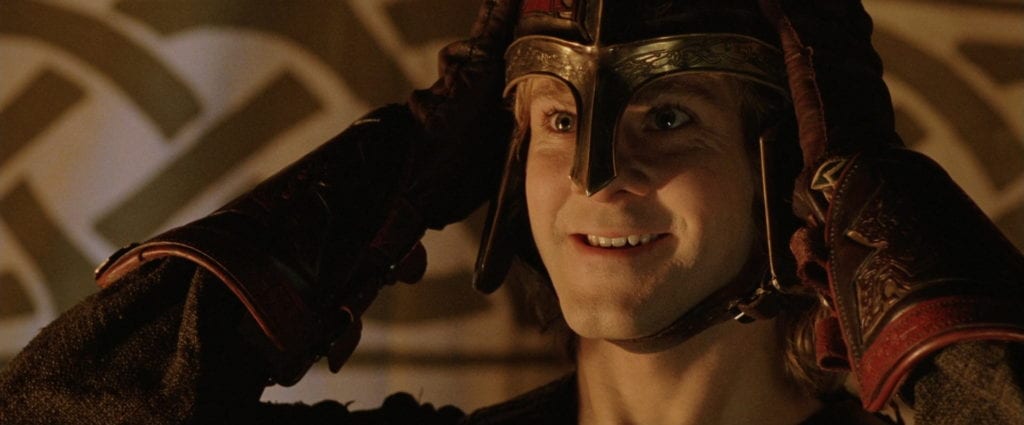
From Dark Dunharrow
This backdrop serves the role of a typical Tolkien backdrop. It acts as a spotlight or counterweight to the character’s emotional statuses. It’s clearest in Théoden. The king knows that some serious shit is about to go down and he’s not certain he’ll make it out. It’s unclear whether this is due to some kind of premonition or if simply the reality of an old man riding into battle with difficult odds. But it’s on his mind: “For a while the king sat silent. At last he spoke. “So we come to it in the end,” he said: “the great battle of our time, in which many things shall pass away.”” And later: “Say to Denethor that in this hour the King of the Mark himself will come down to the land of Gondor, though maybe he will not ride back.”
There’s a strong sense of loss in nearly all of Théoden’s words in this chapter. And in the context of the lost, forgotten men discussed just pages before, there’s a sense of existential somberness that threads through this chapter to mirror the actual, physical darkness that’s spreading. And it’d be easy for this to become too dour, too fast. But it doesn’t, because Théoden has grown into such a bright, hopeful character. His kindness to Merry continues. He makes a point of calling Éomer and Éowyn son and daughter (rather than sister-son and sister-daughter). And he never does this with a sense of despair or desperation—continuing his countering of Denethor—but simply because it is a good or kind thing to do.
If I recall correctly, Théoden never really expresses a need to be remembered in songs. That desire is not necessarily a bad thing in Tolkien’s universe, of course. But Théoden’s seeming indifference to it, paired with the looming, Púkel-man-shaped threat of falling into oblivion, makes the end of this chapter really lovely. As the king leads his troops in a rush towards Minas Tirith, Tolkien steps out of the time of his story for a moment. And he lets us know that Théoden, whether or not he asked for it, will be long remembered in song. This insistence upon memory is a nifty little counter to the forgetting from earlier in the chapter. And it’s a needed strand of brightness, and a little solace for those of us who know what’s coming in 50 pages or so.
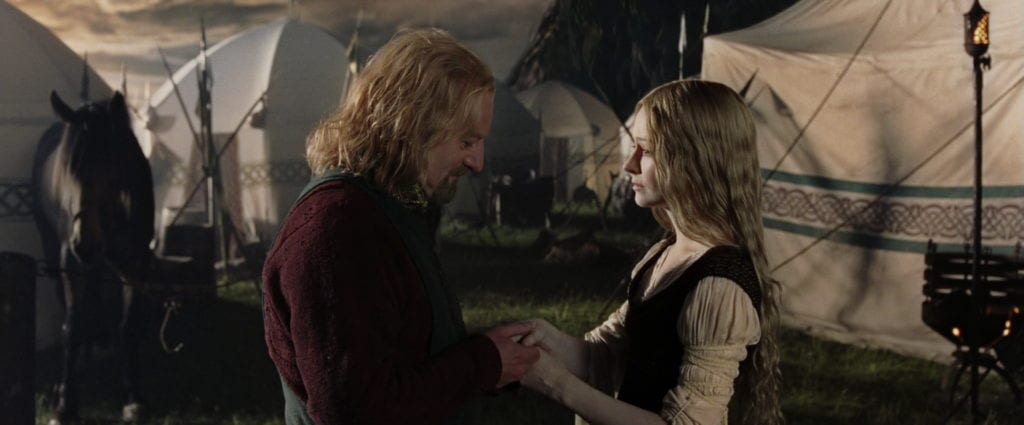
Final Comments
- A quick caveat. It’s more than possible that the Púkel-men had loads of songs about them at some point. Or that Théoden will one day be forgotten. But in the context of the fiction of this chapter—and in the work’s larger themes of hope and despair—I do think that the contrast is meaningful.
- So, uh, it’s been quite a wild ride in the Tolkien fandom recently? You can read about all of it here (and thank you to my friend John for showing me such a handy link). We are getting a five-season Amazon TV show with a budget that is literally the GDP of a small country. We are getting a Tolkien biopic starring Nicholas Hoult and Lilly Collins, which has just finished filming. The Fall of Gondolin is coming out courtesy of editor Christopher Tolkien, who either has a very loose definition of retirement or is just getting his named slapped on things now. And, in truly the darkest of all these timelines, Universal Studios is possibly building a… Middle-earth… Land? as part of a fourth theme park in Florida. I am trying to retain some optimism regarding any of this, with increasingly bad results. Maybe it’ll be fine? It’ll probably be garbage? I don’t know? If Gandalf won’t tell people not to weep neither will I.
- I would rather Théoden be my king than Aragorn, don’t tell.
- For reasons of time and length I didn’t really have a chance to talk much about Merry. But he is delightful in this chapter! His discussion of the mountains (quoted below in a place you can probably guess) is lovely on an aesthetic level and a nice exploration of Merry himself. He’s always been a pretty bright, curious, and intelligent hobbit (remember all his planning back in Fellowship?). So, it’s nice to catch up with him here when his theoretical learning and enjoyment becomes reality. It’s also a nice mirror with Frodo and Sam’s discussion of stories, which takes place less than a day later. His reference to how he’ll be remembered in songs also nicely highlights the chapter’s concerns.
- Does anyone remember whether or not they recognized Dernhelm as Éowyn on their first read? I don’t remember, but can’t imagine that I would have guessed, despite some somewhat heavy-handed clues. I was a curious child but never an observant one.
- Also, all the props to Éowyn for choosing Dernhelm as her undercover name, which roughly translates to Secret Helmet. Keep ‘em guessing, girl. What a power play.
- It’s a small moment, but I like the reference to Éowyn quelling the potential discontent among her people. It’s a nice indication that while she resents her duty, she’s also probably pretty good at it. I also like her relationship with Merry, which I’m sure I’ll write about later. Let no one say that Éowyn’s fight for liberation is not intersectional.
- “In the midst of these gloomy thoughts he suddenly remembered that he was very hungry.”
- I got a kick out of how this chapter starts. “Now all roads were running together to the East to meet the coming of war and the onset of the Shadow. And even as Pippin stood at the great gate of the City and saw the Prince of Dol Amroth ride in with his banners, the King of Rohan came down out of the hills.” It’s hard not to read the opening line of this chapter as Tolkien breathing a sigh of relief. He finally has all his story lines relatively matched up!
- Prose Prize: Merry looked out in wonder upon this strange country, of which he had heard many tales upon their long road. It was a skyless world, in which his eye, through dim gulfs of shadowy air, saw only ever-mounting slope, great walls of stone behind great walls, and frowning precipices wreathed with mist. He sat for a moment half-dreaming, listening to the noise of water, the whisper of dark trees, the crack of stone, and the vast waiting silence that brooded behind all sound. He loved mountains, or had loved the thought of them marching on the edge of stories brought from far away; but now he was borne down by the insupportable weight of Middle-earth. This is how I too felt when I saw big mountains for the first time. Though I was kinda into the vast, ominous, weightiness, so I’m not sure what that says about me.
- Contemporary to this chapter: Frodo, Sam, and Gollum make it to Minas Morgul. Pippin has his long day in Minas Tirith, and the next chapter (“The Siege of Gondor)” overlaps with the second half of this one. Most of Book V is on the same timeline now, though Frodo and Sam are still behind.

